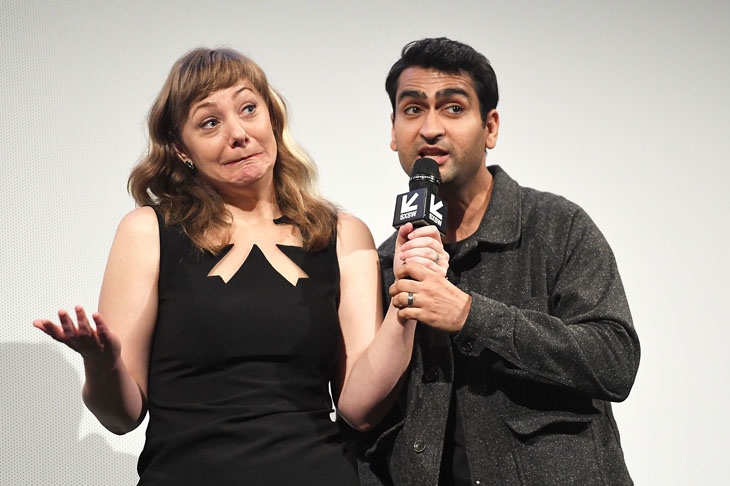The Big Sick is a rom-com that’s smarter than most rom-coms, which isn’t saying much, admittedly. It stars a Muslim man from a Pakistani background as the romantic lead, which has to be all to the good, and one character does pinpoint exactly what’s wrong with the internet: ‘You go online and they hate Forrest Gump… best fucking movie ever!’ (So true.) But at two hours it is overlong — Christopher Nolan had evacuated Dunkirk in that time, let’s remember — and it does leave a bad taste in the mouth. (Big sick, bad taste. Although, in fact, it’s not that kind of sick. This film may have the worst title of all time.)
Most rom-coms follow the same pattern: the cute meet, the fall out, then the reconciliation and maybe, along the way, someone will fall into a wedding cake or bring down a huge display of china in a department store? Always a risk, when dating. This, mercifully, avoids the physical comedy, but otherwise follows the pattern. However, as it’s founded on real-life events, perhaps we shouldn’t get too uppity. Produced by Judd Apatow (loads of stuff, although he hasn’t had a big-screen critical hit since 2011’s Bridesmaids), and directed by Michael Showalter, this is based on the actual courtship of Kumail Nanjiani, a stand-up comedian who plays himself here, and his wife, Emily V. Gordon, with whom he wrote the script. (She does not appear, but is instead played by Zoe Kazan.) At the outset, Nanjiani is an Uber driver and stand-up in Chicago who meets Emily when she heckles him one night. They sleep together. They start seeing each other. But he’s under pressure from his family to enter into an arranged marriage with a Pakistani woman, and when Emily discovers, some months down the road, that he hasn’t yet told his parents about her, and likely never will, she breaks it off. That, possibly, may have been that, but then he hears she’s in hospital with some illness that means she has to be put into a medically induced coma. This is the sickness that is big — get it now? — and he feels duty-bound to be at her bedside.
There is genuine, bone fide, sparklingly believable chemistry between the two leads, which is excellent, and such a relief, particularly after tramping round Hampstead with Diane Keaton and Brendon Gleeson, who made you long to be put into a medically induced coma yourself. There are some nicely played scenes, especially early on, as when, for instance, Emily tries to leave Kumail’s apartment in the middle of the night to poo somewhere else and I know, it sounds gross, but it turns out sweet, and statistically, more likely to come up when you’re dating than toppling into china, studies show. But she is absent for half the film, which means the narrative has to go elsewhere, and this is where it gets sticky.
Emily’s tricky parents (Holly Hunter, Ray Romano) truck up, and Kumail is forced to chaperone. They are fully written characters. They have traits. Their relationship has a back story. They’re awarded some of the best lines. Whereas his parents (Anupam Kher, Zenobia Shroff)? Plain stereotypes, more or less, what with always pressing food on him and prospective brides just happening to ‘drop by’ — this is a running joke — and it feels kind of racist. Further, no prospective bride from a Pakistani background could be a patch on Emily, is our understanding. None could be as bright, charming, funny, sexy. They always arrive with their matrimonial head shots which, over the years, Kumail has collected in a old cigar box. To convince Emily that he loves her, and will turn his back on his family if necessary, he burns the photographs, then presents her with the ashes, and it’s like he’s saying: ‘Hey, white girl, look how many brown girls I’ve incinerated for you! But you’re so worth it!’ This is the bad taste I can’t remove. A better film on this subject, if you’re interested, is Meet the Patels (available on Netflix), which does not sell anyone down the river.
There are other problems. The length, for one, as this is essentially a 90-minute film, padded out with too many scenes showing Nanjiani hanging out with his comedy pals in comedy clubs, which are as pointless as they are tiresome. (No one, I would moot, is as interested in comedians as comedians.) It also has its corny moments, and finishes with an iffy denouement which came after what I had already thought was the denouement. I think I put my coat on at least three times. Still, it is smarter than most, so you could say I liked it but also didn’t like it. Not very helpful, I know. But that’s just how it is sometimes.






Comments